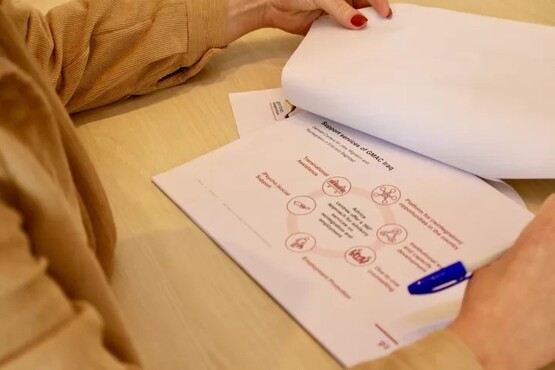Migration in Iraq: Shaping migration and livelihood pathways

Iraq faces significant migration challenges both as a country of origin and return. Many Iraqis seek work and educational opportunities abroad. Enhancing regular migration pathways creates opportunities for Iraqi citizens, including workers and students, while contributing to the country’s development.
At the same time, many people also return to their homes, either after being internally displaced or returning from abroad. Often, their homes have been destroyed or they have sold everything, leaving them with nothing to return to. As a result, many require social and economic reintegration support. Returnees from Europe and neighbouring countries face barriers to rebuilding their lives, such as a lack of tailored assistance programmes, a weak labour market, and insufficient market-relevant qualifications. Reintegration of returning migrants holds significant potential for Iraq's development, as it strengthens the local workforce, stimulates economic growth through entrepreneurship, and creates jobs.
As a Champion Country for the Global Compact for Migration, Iraq is working towards a structured migration framework that enhances regular migration pathways, reintegration services, and institutional cooperation. In line with these efforts, Chancellor Olaf Scholz and Prime Minister Mohammed Shia' Al-Sudani reaffirmed their commitment to strengthening bilateral cooperation on migration governance in January 2023 as part of the German-Iraqi workplan.
Our approach: Support for reintegration and migration
GIZ contributes to Iraq’s sustainable migration governance, ensuring that migration serves as a driver of economic growth and social stability. Since 2018, GIZ has supported returning migrants in enhancing their prospects in Iraq. Recognising the high demand, especially among young people, for job opportunities abroad, GMAC has now started informing people about regular migration pathways to Germany and other destinations.
Consultations: Through the two Iraqi-German Centres for Jobs, Migration and Reintegration (GMACs) in Baghdad and Erbil, GIZ offers consultations on economic opportunities within the country for Iraqi citizens who have returned from abroad, as well as for the disadvantaged local population. They also provide consultations for Iraqis interested in regular migration to Germany and other regional destinations.
- Reintegration Assistance: For returnees in need of reintegration support, GMAC offers socio-economic assistance through referrals to skill development and vocational training programmes to increase opportunities in the labour market. To facilitate this, GIZ supports internship and job placements. Additionally, GIZ offers business start-up training courses and grants. Through their own businesses, returnees create an income for themselves and their families, as well as for potential employees. Lastly, GIZ also provides mental health and psychosocial support in cooperation with specialised civil society partners.
- Labour Migration Support: For those interested in labour migration, GMAC offers referrals to partners that can assist with preparatory steps, including job searches, language acquisition, and soft-skills training, as well as migration preparation courses.
- Capacity Strengthening: GIZ strengthens the institutional capacities of the Ministry of Labour and Social Affairs (MoLSA) in Federal Iraq and the Kurdistan Region of Iraq, as well as other stakeholders, to support returnees and potential migrants in a target group-specific manner. These measures include training for staff and support in the development and implementation of suitable strategies.
As part of the overall German and European support for sustainable job creation, GIZ supports inclusive labour market policies and activities that improve job prospects for vulnerable groups, including refugees and internally displaced persons.
Shaping Iraq’s migration policies
On 19–20 February 2025, the Ministry of Migration and Displacement (MoMD), in partnership with IOM and GIZ, will host the Stakeholder Dialogue on Promoting Safe, Orderly, and Regular Migration in Baghdad. This event is an important milestone in the ongoing efforts to develop the Iraqi National Action Plan to Enhance Safe, Orderly, and Regular Migration (2025–2029). During the conference, government officials, diplomatic missions, private sector actors, and civil society will identify gaps in current migration pathways. They will explore the potential of bilateral labour migration agreements and skills mobility partnerships to create opportunities for Iraqi citizens, as well as discuss the role of the private sector and civil society. For example, the high level of education in Iraq offers potential for skills mobility partnerships that benefit both Iraq and the destination country. One such partnership is the THAMM+ project, which aims to anchor development- and demand-oriented labour migration between North Africa and Europe sustainably. The dialogue also laid the foundation for developing a unified roadmap that maximises the benefits of regular migration for Iraq’s economy and its people